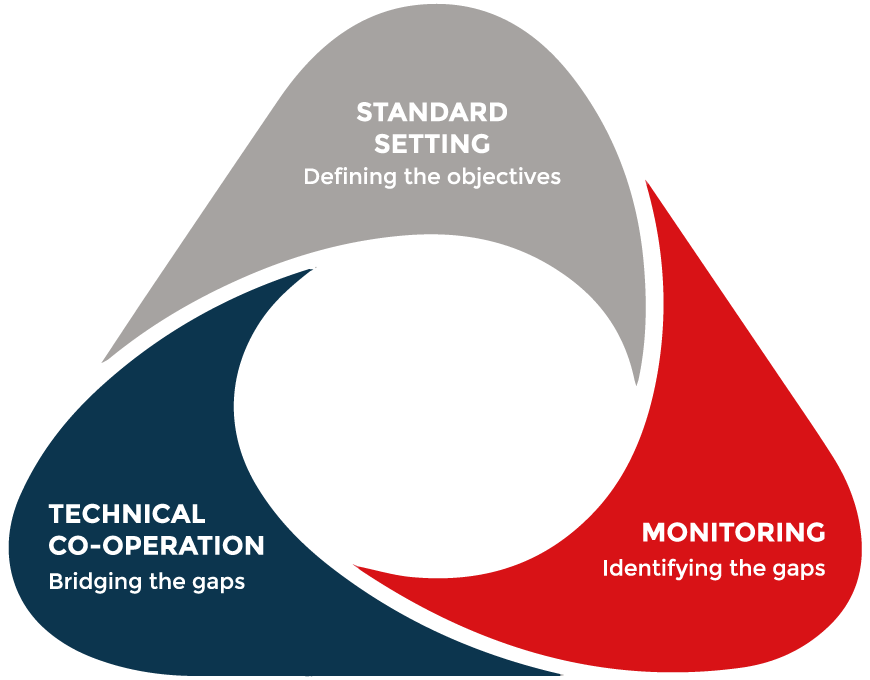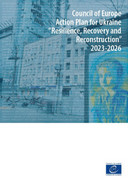Strategic co-operation documents
The Directorate of Programme Co-ordination, in close collaboration with the Directorate of Political Affairs and the operational directorates general, produces Framework Co-operation Documents (Action Plans, etc.). This is carried out through in-depth consultations with national authorities via the Ministries of Foreign Affairs. Likewise, consultations with other national and international players, including donors, are conducted to ensure a co-ordinated approach to the co-operation delivered on the ground.
These strategic documents set out a series of priority actions in the fields of human rights, rule of law and democracy. Council of Europe technical assistance programmes form an integral part of the unique strategic triangle of standard-setting, monitoring and co-operation: the development of legally binding standards is linked to their monitoring by independent mechanisms and supplemented by technical co-operation to facilitate their implementation. The Council of Europe’s actions are developed and implemented in areas where the Council of Europe has strong expertise and added value.

Figure 1: Council of Europe strategic triangle
The co-operation documents build, to a large extent, on the most recent decisions, resolutions, recommendations, reports conclusions, opinions and findings of the Council of Europe’s monitoring and expert advisory bodies in respect of the country concerned as well as on the results of the previous framework co-operation document with the Council of Europe, where relevant. They also take into account the challenges identified in the Secretary General’s annual reports on the State of Democracy, Human Rights and the Rule of Law in Europe. In addition, the co-operation documents reflect the priorities of the reforms in a given country.
The projects defined in the co-operation documents receive funding from multiple sources, notably from the Council of Europe ordinary budget and voluntary contributions, donor countries and international organisations. A large number of projects pertaining to the co-operation documents are implemented via joint programmes between the Council of Europe and the European Union.
The Committee of Ministers of the Council of Europe is responsible, through its Group of Rapporteurs on Democracy (GR-DEM) and Group of Rapporteurs on External Relations (GR-EXT), for the overall assessment of the results of the implementation of co-operation documents.
The overall co-ordination of technical co-operation carried out by the Council of Europe falls within the Directorate of Programme Co-ordination's remit, which steers the programming of and fund-raising for co-operation actions whilst ensuring the good functioning of relevant Council of Europe Offices in the field (where applicable). The Directorate of Programme Co-ordination submits interim and final reports on the progress and outcomes of the co-operation to the Committee of Ministers.
Progress made under a co-operation document is jointly assessed by the Council of Europe and the national authorities concerned. For this purpose, a Steering Committee is established, composed of representatives of the relevant Ministry of Foreign Affairs and other national stakeholders involved in the implementation of the co-operation document as well as of representatives of the Council of Europe.
Expertise, the basis of co‑operation projects’ added value, comes from relevant services in the entire Organisation. Project implementation can involve needs assessments, legislative expertise, capacity‑building, awareness‑raising and peer‑to‑peer reviews. The methodology followed, in line with the Council of Europe Project Management Methodology (PMM), aims to reinforce ownership by national stakeholders and to ensure the sustainability of the outcomes.
In addition, the co-operation designed by the Council of Europe follows a “multi-institutional approach”, which allows different Council of Europe’s institutions and bodies to target governmental stakeholders, parliaments, independent governance institutions such as the Ombudsperson, local and regional authorities and civil society, in order to create a unique leverage for comprehensive, inclusive, successful and sustainable reforms.
The Council of Europe prioritises a human rights approach at all levels and stages of its activities. For more information see the Human Rights Approach Practical Guide for co-operation projects. Its acquis, including Council of Europe legal instruments and institutions, combined with the principles of equality, non‑discrimination, balanced participation brings further added value to the Council of Europe activities. As a component of this human rights approach, the Council of Europe emphasises gender mainstreaming throughout its project activities in line with its Gender Equality Strategy 2024-2029. For more information, see the Council of Europe web page on gender mainstreaming and Gender mainstreaming toolkit for co-operation projects. The Council of Europe also promotes civil society participation, as outlined in the Guidelines on civil society organisations’ participation in Council of Europe’s co-operation activities.
The implementation of co-operation documents also seeks to contribute to the Sustainable Development Goals of the United Nations (SDGs).
*All references to Kosovo, whether the territory, institutions or population, in this text shall be understood in full compliance with United Nation's Security Council Resolution 1244 and without prejudice to the status of Kosovo.








